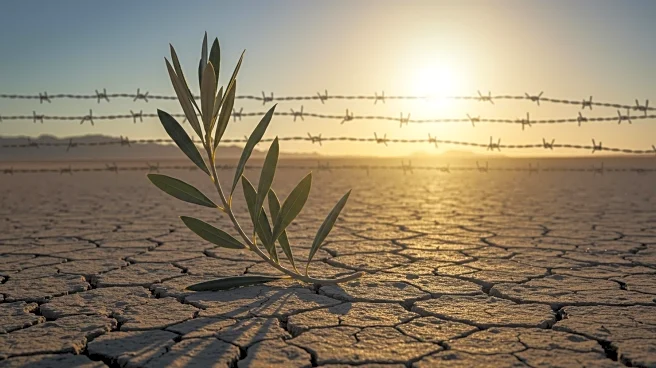What's Happening?
Over 100 humanitarian organizations, including Oxfam and Médecins Sans Frontières, have signed a joint letter urging Israel to stop the 'weaponization of aid' in Gaza. The groups claim that new Israeli regulations, introduced in March, have severely restricted their ability to deliver essential supplies, exacerbating the starvation crisis in the region. According to the letter, these regulations require detailed information about Palestinian staff and compliance with security measures, which many organizations find prohibitive. Israel maintains that these rules are necessary to prevent aid from being diverted to Hamas, although humanitarian groups argue that the restrictions have left hospitals without basic supplies and vulnerable populations suffering from hunger and preventable illnesses.
Why It's Important?
The restrictions on aid delivery in Gaza have significant humanitarian implications, potentially worsening the already dire conditions faced by civilians. The inability to deliver essential supplies could lead to increased mortality rates due to starvation and lack of medical care. This situation also raises ethical concerns about the politicization of humanitarian aid and the impact on international relations, as countries and organizations may reconsider their stance on the Israeli-Palestinian conflict. The ongoing crisis could influence public policy and diplomatic efforts aimed at resolving the conflict and addressing humanitarian needs.
What's Next?
Humanitarian organizations are likely to continue advocating for changes to Israeli policies to allow for the delivery of aid. International pressure may increase, with potential diplomatic interventions from countries concerned about the humanitarian impact. The situation may also prompt discussions within the United Nations and other international bodies about the need for a coordinated response to ensure aid reaches those in need. Israel may face growing scrutiny and calls for transparency regarding its aid policies and their implementation.
Beyond the Headlines
The situation in Gaza highlights broader issues related to the politicization of aid and the challenges faced by humanitarian organizations operating in conflict zones. The restrictions imposed by Israel may set a precedent for other regions, affecting global humanitarian efforts. Additionally, the crisis underscores the importance of maintaining the independence and neutrality of aid organizations to effectively address humanitarian needs without political interference.










